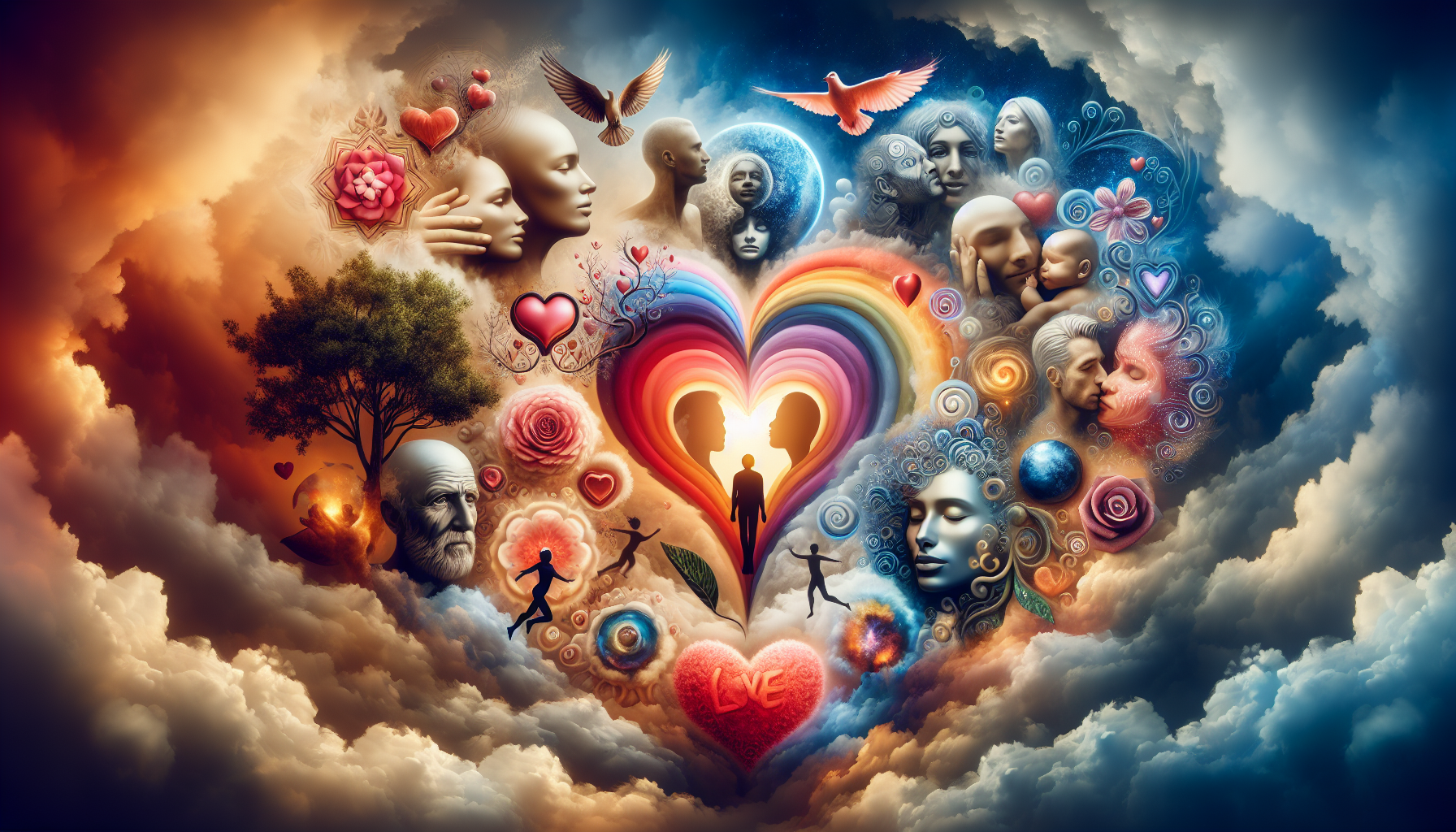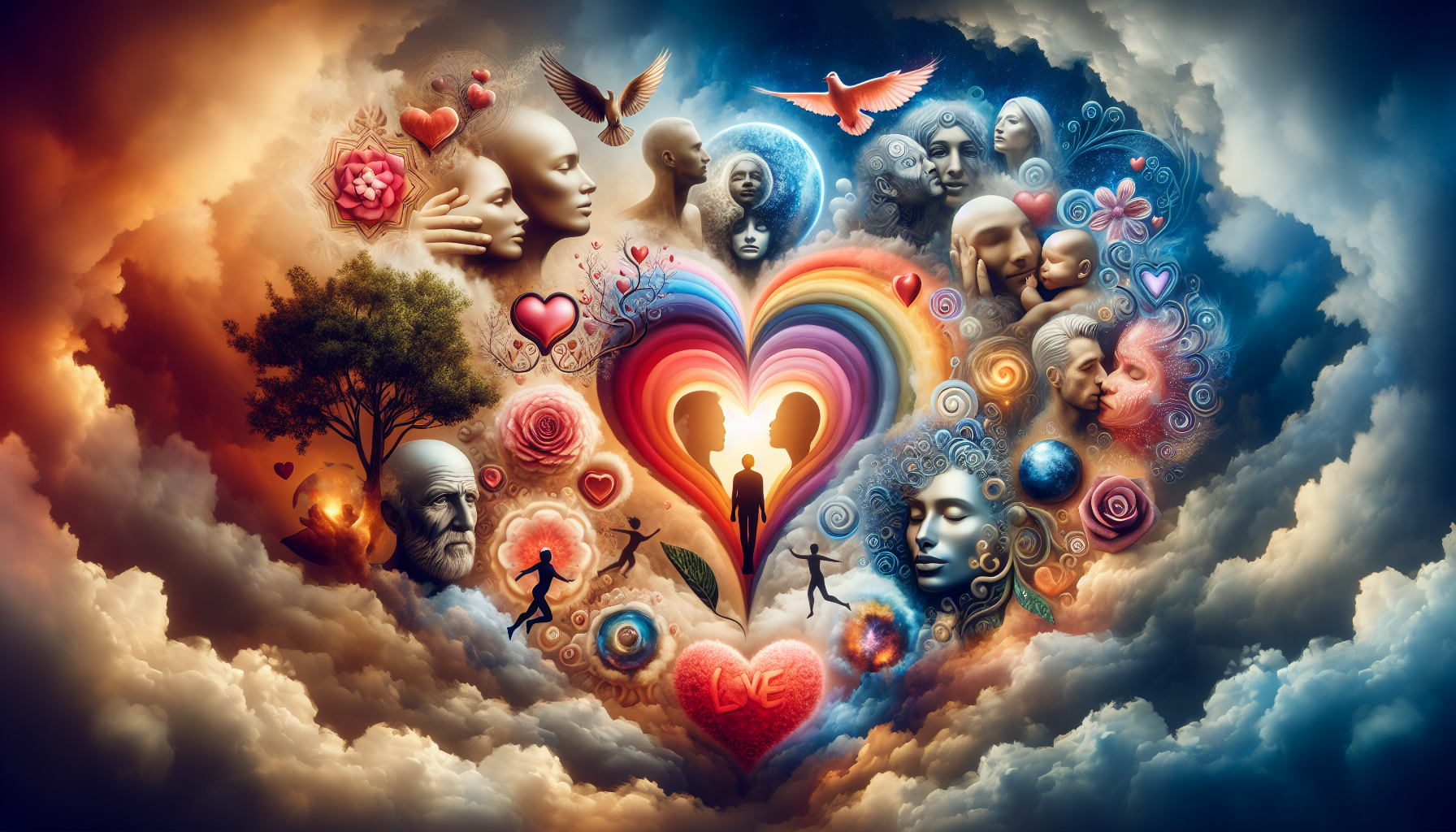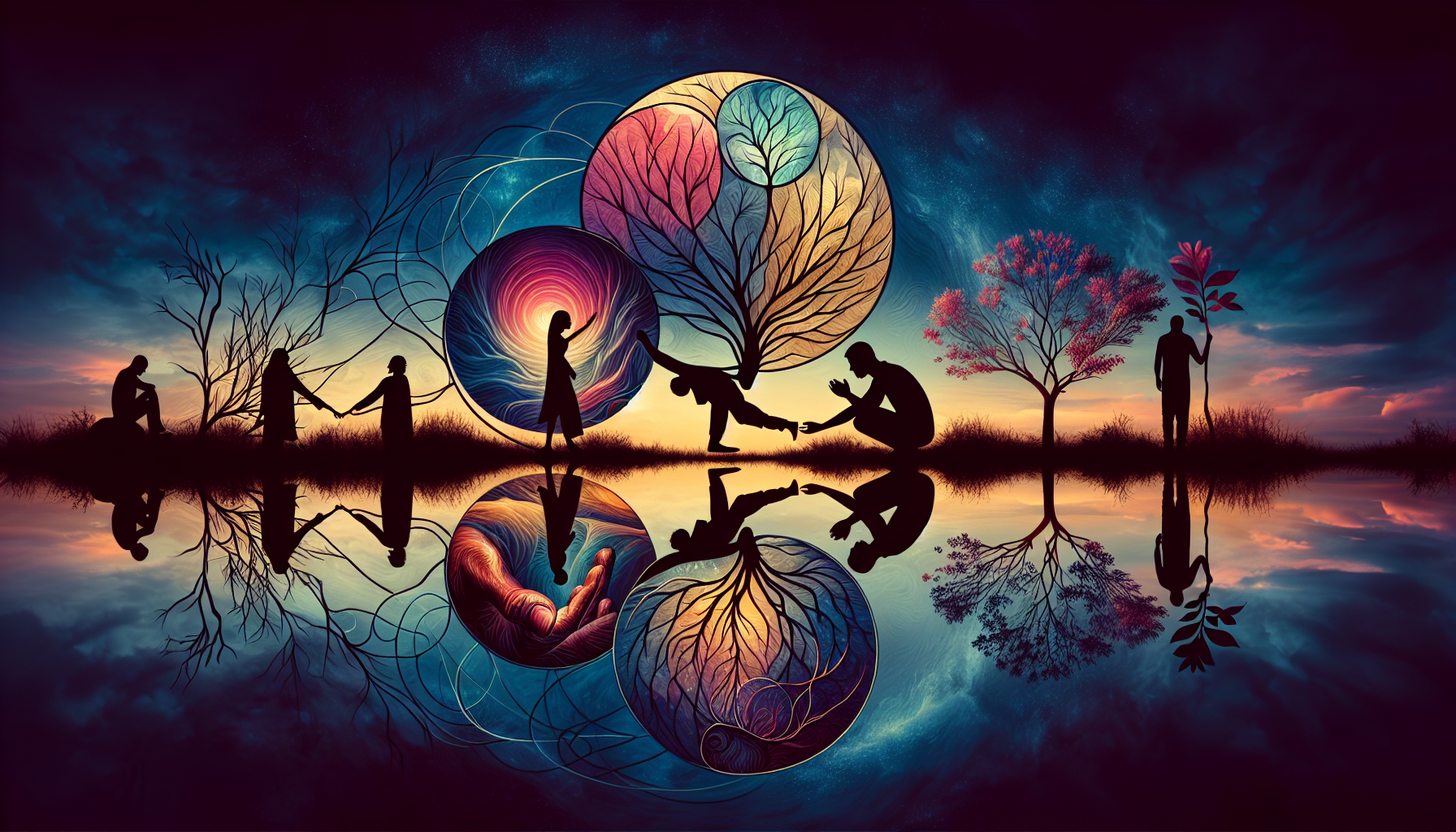
Love is often considered one of life’s greatest mysteries, an ethereal force that transcends words and logic. It is a complex intertwining of emotions, actions, and connections that has puzzled philosophers, poets, and scientists alike throughout the ages. But what is the true definition of love? Is it a feeling, a choice, or something else entirely? In this article, we will explore the depths of love, unraveling its intricacies and shedding light on the profound impact it has on our lives. So, prepare to embark on a journey of discovery as we venture into the realm of love, seeking to uncover its essence and unravel its enigmatic nature.
Different Perspectives on Love
Love is a complex and multifaceted emotion that can be experienced and understood in various ways. Different perspectives on love highlight the diverse ways in which this powerful emotion manifests itself in our lives.
Romantic Love
Romantic love, often associated with passionate desire and intense emotions, is one of the most well-known and celebrated forms of love. It encompasses the deep connection and affection between two individuals, typically involving romantic relationships. Romantic love is characterized by strong feelings of attraction, infatuation, and intimacy.
Familial Love
Familial love is the strong bond shared between family members. It encompasses the love between parents and children, siblings, and extended family members. Familial love is characterized by care, support, and a sense of belonging. It often involves lifelong connections, unconditional love, and the willingness to sacrifice for family members.
Platonic Love
Platonic love, also known as non-sexual or non-romantic love, represents deep friendships and emotional connections that are devoid of any sexual or romantic desires. Platonic love is marked by trust, loyalty, and a strong emotional bond between individuals. It can be experienced between friends, colleagues, or even strangers, emphasizing the importance of non-romantic relationships in our lives.
Self-Love
Self-love is the appreciation, acceptance, and care for oneself. It involves recognizing one’s worth, valuing personal well-being, and practicing self-care. Self-love is crucial for maintaining healthy relationships with others and is essential for personal growth and happiness. It involves setting healthy boundaries, practicing self-compassion, and prioritizing self-care.
The Biological Science of Love
Love has deep roots in our biological makeup, with various physical and chemical reactions taking place when we experience this powerful emotion. Understanding the biological science of love can shed light on why we feel the way we do when we are in love.
Physical and Chemical Reactions in Love
Love triggers numerous physical and chemical reactions in the brain and body. When we experience love, areas of the brain associated with pleasure and reward are activated, leading to feelings of euphoria and happiness. Additionally, love releases hormones such as oxytocin, which is responsible for bonding and attachment, and dopamine, which is associated with pleasure and desire.
The Role of Hormones in Love
Hormones play a significant role in love and romantic relationships. Oxytocin, often referred to as the “love hormone,” is released during intimate moments, such as physical touch, and strengthens emotional bonds between individuals. Dopamine, known as the “pleasure hormone,” is responsible for the intense feelings of desire and motivation experienced in romantic love.
Evolutionary Perspective on Love
From an evolutionary perspective, love serves as an adaptive mechanism that facilitates bonding and reproduction. The desire for romantic love and the strong emotional connection between partners maximize the chances of successful reproduction and the survival of offspring. Evolutionary theories also suggest that certain characteristics, such as physical attraction and nurturing behaviors, are preferred in potential partners due to their potential reproductive advantages.

Love as an Emotion
Love is not only a subjective experience but also an emotion with distinct characteristics and effects. Exploring the emotional aspect of love can provide insights into its impact on our overall well-being.
Characteristics of Love as an Emotion
Love is characterized by a range of emotions, including joy, happiness, affection, and contentment. It can also involve feelings of vulnerability, fear of loss, and jealousy. Love is often accompanied by a sense of deep connection, empathy, and understanding towards the loved one.
The Connection Between Love and Happiness
Love is closely linked to happiness and well-being. When we experience love, our brain releases neurotransmitters and hormones that contribute to feelings of pleasure and contentment. Love provides emotional support, a sense of purpose, and a feeling of belonging, all of which contribute to overall happiness and life satisfaction.
The Dark Side of Love
Despite its positive aspects, love can also have a darker side. Love can lead to pain, heartbreak, and intense emotional turmoil when relationships end or when love is unrequited. Obsessive or possessive love can also become unhealthy and detrimental to the well-being of individuals involved. It is important to acknowledge and address these negative aspects of love to maintain healthy relationships and emotional well-being.
Love as an Action
Love is not merely an emotion; it is also a verb, an action that requires effort, compassion, and selflessness. Examining how love manifests through actions sheds light on the transformative power of love in our lives.
Acts of Love and Kindness
Acts of love and kindness play a vital role in nurturing and sustaining relationships. These acts can be as simple as expressing gratitude, offering a helping hand, or actively listening to a loved one. Small acts of love and kindness can strengthen emotional bonds, promote trust, and create a positive and loving environment for all individuals involved.
Sacrifice and Compassion in Love
Love often requires sacrifice and compassion. It may involve putting the needs and well-being of others before our own, making compromises, and showing empathy. Sacrifices made out of love can strengthen relationships, deepen emotional connections, and foster a sense of mutual respect and care.
Nurturing and Support in Love
Love involves providing nurturing and support to our loved ones. This can encompass emotional support during challenging times, offering encouragement and reassurance, and creating a safe space for vulnerability and growth. Nurturing and supportive actions demonstrate our commitment to the well-being and happiness of those we love.

The Cultural Influence on Love
Love is not a universal experience but is influenced by cultural norms, traditions, and societal expectations. Understanding the cultural influence on love helps us appreciate the diversity of expressions and perceptions of love across different societies.
Variations in Love Across Cultures
Love varies greatly across different cultures. Cultural norms and beliefs shape how love is expressed, experienced, and valued. For example, some societies prioritize arranged marriages as a manifestation of love and commitment, whereas others prioritize individual choice and romantic love. Understanding these cultural variations broadens our perspective and appreciation for the diverse ways love is understood and expressed.
Historical Perspectives on Love
Throughout history, love has been viewed and understood differently in various time periods. The concept of love has evolved and transformed, influenced by societal, religious, and philosophical beliefs. Exploring the historical perspectives on love enables us to recognize the dynamic nature of this emotion and its complex interplay with cultural and societal changes.
Societal Expectations and Norms in Love
Societal expectations and norms often shape our understanding and experience of love. These expectations can influence the way relationships are formed, sustained, and valued. For example, societal norms may dictate gender roles within romantic relationships or place emphasis on specific milestones, such as marriage or starting a family. Becoming aware of these societal influences allows us to critically examine and challenge societal norms that may be restrictive or oppressive.
Love in Literature and Arts
Love has long been a recurring theme in literature, movies, music, and other artistic mediums. Artists and creative minds have explored love’s complexities, beauty, and transformative power, creating works that resonate with audiences and evoke a deep emotional response.
Romanticism and Love
Romanticism, a cultural movement that emerged in the late 18th century, celebrated love as a source of inspiration, beauty, and the idealized expression of human emotions. Romantic literature and art often portrayed love as a profound and transcendent emotion that defied societal boundaries and norms. Works by romantic poets such as William Wordsworth and John Keats explored the themes of love, nature, and the human experience in profound and emotionally captivating ways.
Depictions of Love in Movies and Music
Movies and music have played a significant role in depicting and portraying love in various forms. From epic love stories to heartfelt ballads, these artistic mediums have the ability to capture the nuances and complexities of love, evoking a range of emotions in their audiences. Love stories portrayed in movies and love ballads sung by musicians often inspire and resonate with individuals, reflecting their personal experiences and desires.
Love as a Source of Inspiration
Love has long been a muse for artists, writers, and creators across different artistic disciplines. The intensity and transformative power of love have inspired countless works of art, literature, and music throughout history. Love can serve as a catalyst for creativity, driving individuals to express their emotions, thoughts, and experiences through artistic mediums. It fuels imagination, evokes profound emotions, and provides a deep well of inspiration.
The Philosophy of Love
Love has been a subject of philosophical inquiry for centuries, with thinkers and philosophers offering various theories and perspectives on the nature and essence of love. Examining the philosophical aspects of love invites us to reflect on its foundational role in human existence and ethical considerations.
Love as a Fundamental Human Need
Many philosophers argue that love is a fundamental human need and an essential aspect of human flourishing. Love nourishes our emotional and psychological well-being, providing a sense of belonging, connection, and purpose. It is seen as a fundamental aspect of a fulfilling and meaningful life, contributing to our overall happiness and well-being.
Different Philosophical Theories on Love
Philosophers throughout history have proposed various theories on the nature and essence of love. From Plato’s idealized concept of love to John Stuart Mill’s utilitarian perspective, these theories offer frameworks for understanding the complexities of love. Some theories focus on love as a rational attachment, others emphasize its emotional and intuitive aspects, while still, others explore the ethical dimensions of love.
Love’s Connection to Morality and Ethics
Love has deep connections to moral and ethical considerations. Many philosophical theories argue that love is not merely a subjective emotion but also a moral phenomenon that guides our actions and shapes our ethical choices. Love can fuel compassion, empathy, and a sense of moral responsibility towards others. It can drive us to act in ways that promote justice, equality, and the happiness of others.
The Spiritual and Transcendent Love
Love has significant spiritual and transcendent dimensions, manifesting in various religious and spiritual traditions across the world. Exploring the spiritual aspects of love allows us to appreciate its profound connection to the divine and its potential as a transformative force in our lives.
Love in Religions and Spirituality
Love is a central theme in many religious and spiritual traditions. Religions such as Christianity, Islam, Buddhism, and Hinduism emphasize the power of love as a unifying force, connecting individuals with the divine and promoting harmony among humanity. Love is often seen as a sacred and transcendent quality that guides believers toward spiritual enlightenment and union with the divine.
Sacred Love and Divine Love
Sacred love and divine love refer to the spiritual dimensions of love. Sacred love encompasses the love for God, the love for humanity, and the love for all creation. It is an expression of deep devotion, reverence, and connection to something greater than oneself. Divine love involves the belief that love is not only a human emotion but also a divine quality that permeates the universe.
Love as a Path to Enlightenment
In many spiritual traditions, love is seen as a path to personal growth, self-realization, and spiritual enlightenment. By cultivating love and compassion towards oneself and others, individuals can transcend their ego and experience a deep sense of interconnectedness with all beings. Love is believed to be a transformative force that leads to spiritual awakening and liberation from suffering.
Love in the Digital Era
The advent of technology and the digital era have significantly influenced the way we experience and perceive love. Exploring the impact of technology on love sheds light on the challenges and opportunities that arise in the modern world.
Online Dating and Virtual Love
Online dating platforms and virtual interactions have revolutionized the way we meet and connect with potential romantic partners. The digital era has expanded the possibilities for finding love, offering a wider pool of potential partners and facilitating connections across geographical boundaries. Online relationships and virtual love have become increasingly common, creating unique challenges and opportunities in the realm of love.
Challenges and Opportunities of Technology in Love
While technology has made it easier to connect with others, it also presents challenges to love and relationships. The digital era can create a sense of superficiality and make it more difficult to form deep, meaningful connections. Technology can also facilitate deception and dishonesty, as individuals can create false identities or manipulate their online personas. However, technology also offers opportunities for communication, maintaining long-distance relationships, and discovering new ways to express love.
The Impact of Social Media on Love
Social media platforms have become an integral part of modern relationships, influencing how we express and experience love. Social media offers platforms for public displays of affection, sharing moments of happiness, and maintaining connections with loved ones. However, it also presents challenges, such as comparison, jealousy, and the blurring of boundaries between private and public aspects of relationships. Awareness of the impact of social media on love helps navigate these challenges and fosters healthy interactions.
Defining Love for Yourself
Ultimately, the true definition of love is a deeply personal and subjective experience. Each individual possesses their own unique understanding and interpretation of love, shaped by their personal experiences, values, and beliefs. Defining love for yourself involves introspection, reflection, and the recognition that love is a dynamic and evolving concept.
Personal Experiences of Love
Personal experiences play a crucial role in shaping our understanding of love. The love we have received from family and friends, as well as our own experiences in romantic relationships, contribute to our perception of what love is. Exploring these personal experiences allows us to identify the qualities and elements that are most meaningful and significant in our own definitions of love.
Reflections on Love’s Meaning
Reflecting on the significance and meaning of love in our lives can provide insights into our personal definitions. What does love mean to you? What values and emotions are associated with love in your perspective? Taking the time to contemplate these questions helps clarify the unique meaning and essence of love in your life.
Creating Your Own Definition of Love
Creating your own definition of love is an empowering and liberating process. It involves synthesizing personal experiences, reflections, and insights to develop a personalized understanding of love. Your definition of love may encompass the different perspectives discussed in this article or may diverge from conventional notions of love. Embrace the freedom and authenticity of defining love in a way that resonates with your own values and beliefs.
In conclusion, love is a complex and multi-faceted emotion that can be understood from various perspectives. It encompasses romantic love, familial love, platonic love, and self-love. Love has biological, emotional, and philosophical dimensions, and it is influenced by culture, literature, and spirituality. The digital era has also impacted the way we experience love. Ultimately, defining love for yourself is a personal and introspective journey that allows you to create your own unique understanding and meaning of this powerful emotion.




